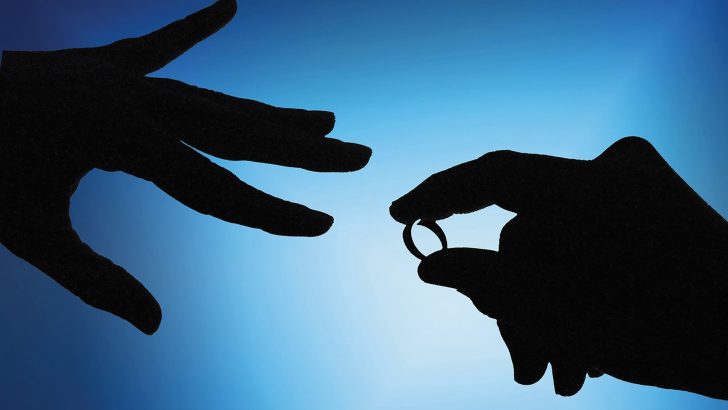There is a good reason to treat marriage differently than other family situations, writes David Quinn
In the Dáil last week, Tánaiste Leo Varadkar described the current definition of the family in the Constitution as “out-of-date”. This might surprise you. Didn’t we have a referendum on marriage in 2015 precisely to ‘modernise’ our view of the family and allow same-sex couples to marry?
But it seems we didn’t go far enough because the Constitution still regards marriage (opposite or same-sex) as having more importance than other family forms, and this does not recognise ‘family diversity’. Furthermore, it is ‘discriminatory’.
We changed the definition of marriage in 2015 in the name of ‘equality’, but as some people pointed out at the time – this columnist included – the logic of the argument meant we would have to move towards ‘family equality’. It would soon be deemed unacceptable to privilege marriage over other family forms.
The Tánaiste was responding to a question from Labour leader, Alan Kelly, about the rights of cohabiting couples, which are less than those of married couples.
Mr Varadkar responded: “the definition of family in Bunreacht na hÉireann, the 1937 Constitution, is out of date.
“It is based on a traditional, more Christian or Catholic view of a family, which is not wrong. It is a man and a woman, although that was changed to allow two men and two women. However, it is based on two married people, as it were, with children. That is what constitutes a family under the Constitution. If that were ever true, we all know it is not true anymore. There are many different forms of families in our society, and there is great diversity in what family means. I believe we should update, modernise and change that definition.”
In other words, we are due yet another referendum.
Here is what the Constitution currently says under the heading ‘The Family’ (Article 41), even after the 2015 vote: “The State pledges itself to guard with special care the institution of Marriage, on which the Family is founded, and to protect it against attack.”
Guarding the institution of marriage with special care means not guarding other forms of the family with the same care.
On the face of it this is, indeed, discriminatory. But is discrimination in this instance justified?
It might seem appalling to say discrimination is ever acceptable, but in fact, we discriminate in all sorts of ways every day, and some of them are defensible, and some are not.
For example, it would be wrong to turn down someone’s job application simply because of that person’s ethnic group or sex. But it might not be wrong to turn them down on the basis of age. They might be only ten, or they might be 85. Would you employ a 10-year-old or an 85-year-old as a first-time pilot for a passenger airline? You would not, and no-one would consider this to be unfair discrimination.
Situations
Different situations should be treated differently, and similar situations should be treated similarly. If there is a relevant difference between two situations, or individuals, it would be ridiculous not to take the difference into account.
The question here is whether there is a good reason to treat marriage differently than other family situations? That is, is there a good reason to guard it with ‘special care’?
Leo Varadkar says the Constitution in its original 1937 form contained a “traditional, more Christian or Catholic view of a family”, based on “two married people with children”. Of course, only a man and a woman in a conjugal union can have children, hence the special place once given to the marriage of two people of the opposite sex.
But the view of marriage as a conjugal union directed towards children is not simply a Catholic or Christian one. It is to be found in all human societies everywhere through almost all of recorded history.
When something is so universal, it must have some very deep justification behind it. The justification is not mysterious; all societies have an interest in ensuring men and women raise the children they bring into the world together and take responsibility for them.
It is a very strange society that gives up this aim. But we have done so, in the name of ‘freedom’ and now intend to go even further. Having declared that marriage between a man and a woman has no special characteristics, we are now pushing to say the same about marriage itself.
Different types
Leo Varadkar is correct, of course, to say that there are now many different types of families in Ireland. There are single-parent families, cohabiting couples, divorced people who have remarried and so on.
But it is a simple fact that the more ‘family diversity’ there is, the less marriage there is, and then we end up with fewer children enjoying the benefits of being raised by a good mother and a good father together, living under the same roof. Marriage more than anything else ties a father to his children and the mother of his children. When marriage weakens, so does that tie.
Ironically, in the very same week Mr Varadkar flagged another marriage referendum, a report was published by the Economic and Social Research Institute (ESRI) which confirmed the importance of family structure.
It examines adolescent behaviour and says: “Family structure emerged as having a significant and consistent relationship with adolescent behaviour, with poorer behaviour across all domains for those in lone-parent families or families that experienced separation during…adolescence.”
This being so, shouldn’t we still do everything possible to encourage men and women to raise their children together, and help them stay together?
Leo Varadkar says the thinking behind Article 41 is ‘out-of-date’, but in fact the evidence backs it up. Only a society that has become ideologically blind can fail to see that evidence, to the detriment of children.


 David Quinn
David Quinn
